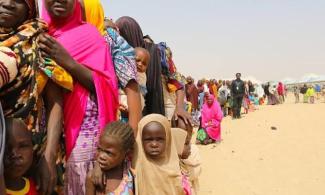
The organisation disclosed this in its third report of the UN secretary-general on children and armed conflict in Nigeria, released on Wednesday.
The United Nations (UN) has disclosed that undue restrictions imposed on aid workers by Nigerian military authorities affected access to humanitarian services in major conflict zones in the country.
The organisation disclosed this in its third report of the UN secretary-general on children and armed conflict in Nigeria, released on Wednesday.
The UN, therefore, said on Wednesday that due to instability and political limitations, humanitarian access remained restricted in many parts of the north-eastern part of Nigeria; hampering the delivery of feeding, education, and other humanitarian response programs for children in a region being terrorised by several non-state actors such as Boko Haram.
The report reads in part: "During the reporting period, north-east Nigeria continued to face heightened insecurity. Boko Haram-affiliated and splinter groups, notably JAS and ISWAP. remained a security threat and continued to carry out brutal attacks against civilians, including children and humanitarian workers, and against the Nigerian Security Forces.
"Those attacks triggered mass population displacements and heightened the risks of grave violations against children. In the first half of 2020, more than 1.8 million people in Adamawa, Borno and Yobe States still lived in internally displaced persons camps or were hosted in communities that were themselves extremely vulnerable.
"By the end of 2020, close to 2 million Nigerians in the north-east, 78 per cent of whom were women and children, were internally displaced, and 256,000 were refugees in Cameroon, Cha and the Niger. By the end of the reporting period in December 2021, there were 1.72 million internally displaced persons in the north-east, with Borno State hosting over 80 per cent of internally displaced population.
"Humanitarian access remained limited in various areas of the north-east, owing to insecurity and government restrictions. The targeting of aid workers and humanitarian supply routes by JAS and ISWAP adversely affected the delivery of services and programmes on nutrition, education and other humanitarian response programmes for children.
"Furthermore, national military authorities continued to impose undue restrictions and requirements on humanitarian agencies, which impeded their ability to deliver timely and effective aid and which run contrary to the principle of humanitarian independence. Among other constraints, humanitarian agencies were restricted from operating outside Government-controlled areas and had to undergo lengthy processes to obtain compulsory authorization for moving personnel, cash and cargo carrying relief materials in the north-east region."
SaharaReporters had reported that a report by Aid Worker Security Database said 461 aid workers were victims of major attacks in conflict zones globally in 2021.
The report said there were more lethal attacks on aid workers in 2021 than in the previous two years. The number of aid workers killed in 2021 – 141 – is the highest number of fatalities since 2013.
South Sudan was the most brutal country to aid workers with 27 cases of assault, six kidnappings, 27 shootings and five unknown cases while Nigeria had one assault case, six abduction cases and two shooting incidents against aid workers, according to the report.